学术英语(社科)Unit-7
- 格式:ppt
- 大小:1.53 MB
- 文档页数:2
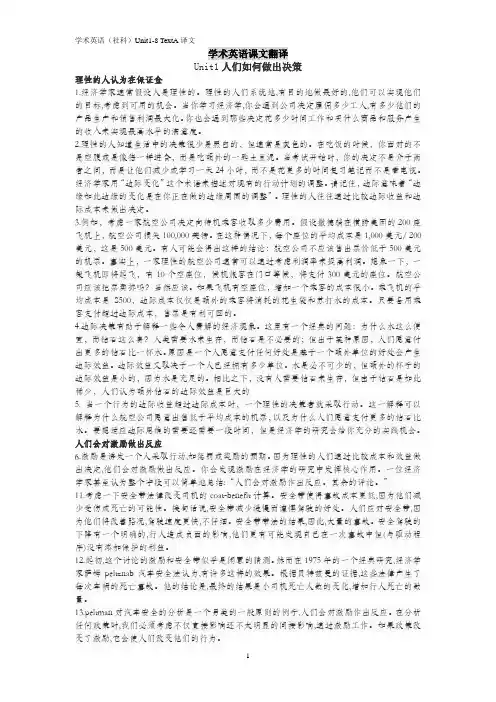
学术英语课文翻译Unit1人们如何做出决策理性的人认为在保证金1.经济学家通常假设人是理性的。
理性的人们系统地,有目的地做最好的,他们可以实现他们的目标,考虑到可用的机会。
当你学习经济学,你会遇到公司决定雇佣多少工人,有多少他们的产品生产和销售利润最大化。
你也会遇到那些决定花多少时间工作和买什么商品和服务产生的收入来实现最高水平的满意度。
2.理性的人知道生活中的决策很少是黑白的,但通常是灰色的。
在吃饭的时候,你面对的不是空腹或是像猪一样进食,而是吃额外的一匙土豆泥。
当考试开始时,你的决定不是介于两者之间,而是让他们减少或学习一天24小时,而不是花更多的时间复习笔记而不是看电视。
经济学家用“边际变化”这个术语来描述对现有的行动计划的调整。
请记住,边际意味着“边缘如此边缘的变化是在你正在做的边缘周围的调整”。
理性的人往往通过比较边际收益和边际成本来做出决定。
3.例如,考虑一家航空公司决定向待机乘客收取多少费用。
假设撒德躺在横跨美国的200座飞机上,航空公司损失100,000英镑。
在这种情况下,每个座位的平均成本是1,000美元/ 200美元,这是500美元。
有人可能会得出这样的结论:航空公司不应该售出票价低于500美元的机票。
事实上,一家理性的航空公司通常可以通过考虑利润率来提高利润。
想象一下,一架飞机即将起飞,有10个空座位,候机旅客在门口等候,将支付300美元的座位。
航空公司应该把票卖掉吗?当然应该。
如果飞机有空座位,增加一个乘客的成本很小。
乘飞机的平均成本是S500,边际成本仅仅是额外的乘客将消耗的花生袋和苏打水的成本。
只要备用乘客支付超过边际成本,售票是有利可图的。
4.边际决策有助于解释一些令人费解的经济现象。
这里有一个经典的问题:为什么水这么便宜,而钻石这么贵?人类需要水来生存,而钻石是不必要的;但出于某种原因,人们愿意付出更多的钻石比一杯水。
原因是一个人愿意支付任何好处是基于一个额外单位的好处会产生边际效益。
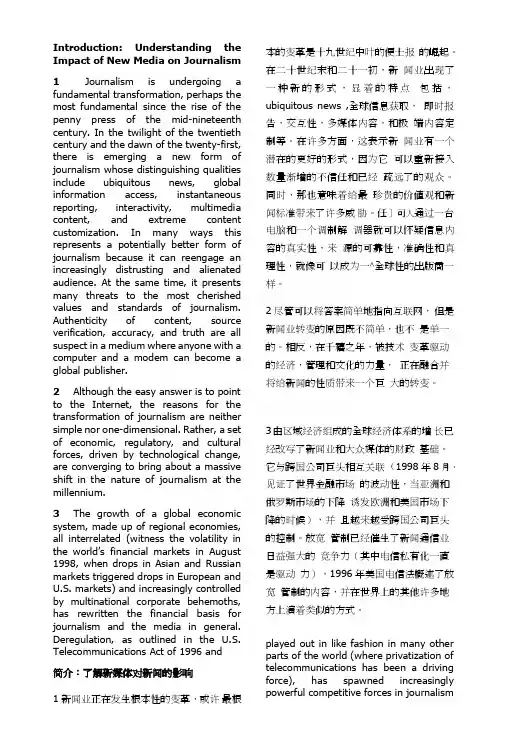
Introduction: Understanding the Impact of New Media on Journalism 1Journalism is undergoing a fundamental transformation, perhaps the most fundamental since the rise of the penny press of the mid-nineteenth century. In the twilight of the twentieth century and the dawn of the twenty-first, there is emerging a new form of journalism whose distinguishing qualitiesinclude ubiquitous news, global information access, instantaneous reporting, interactivity, multimedia content, and extreme content customization. In many ways this represents a potentially better form of journalism because it can reengage an increasingly distrusting and alienated audience. At the same time, it presents many threats to the most cherished values and standards of journalism. Authenticity of content, source verification, accuracy, and truth are all suspect in a medium where anyone with a computer and a modem can become a global publisher.2Although the easy answer is to point to the Internet, the reasons for the transformation of journalism are neither simple nor one-dimensional. Rather, a set of economic, regulatory, and cultural forces, driven by technological change, are converging to bring about a massive shift in the nature of journalism at the millennium.3The growth of a global economic system, made up of regional economies, all interrelated (witness the volatility in the world‟s financial markets in August 1998, when drops in Asian and Russian markets triggered drops in European and U.S. markets) and increasingly controlled by multinational corporate behemoths, has rewritten the financial basis for journalism and the media in general. Deregulation, as outlined in the U.S. Telecommunications Act of 1996 and简介:了解新媒体对新闻的影响1新闻业正在发生根本性的变革,或许最根本的变革是十九世纪中叶的便士报的崛起。
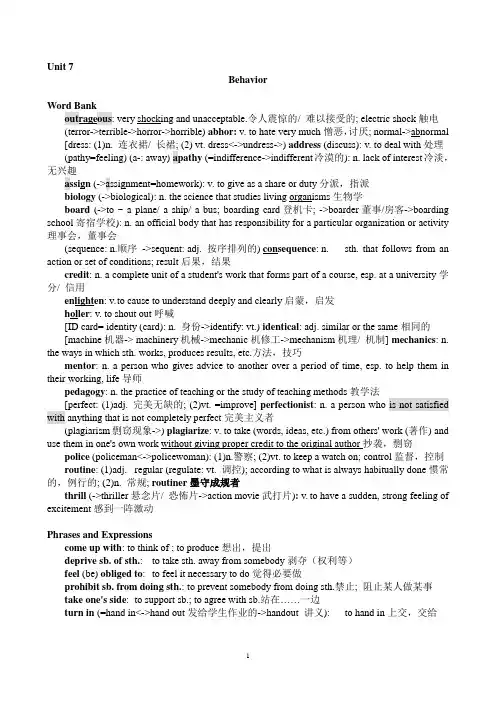
Unit 7BehaviorWord Bankoutrageous: very shocking and unacceptable.令人震惊的/ 难以接受的; electric shock触电(terror->terrible->horror->horrible) abhor: v. to hate very much憎恶,讨厌; normal->abnormal [dress: (1)n. 连衣裙/ 长裙; (2) vt. dress<->undress->) address (discuss): v. to deal with处理(pathy=feeling) (a-: away) apathy (=indifference->indifferent冷漠的): n. lack of interest冷淡,无兴趣assign (->assignment=homework): v. to give as a share or duty分派,指派biology (->biological): n. the science that studies living organisms生物学board(->to ~ a plane/ a ship/ a bus; boarding card登机卡; ->boarder董事/房客->boarding school寄宿学校): n. an official body that has responsibility for a particular organization or activity 理事会,董事会(sequence: n.顺序->sequent: adj. 按序排列的) consequence: n. sth. that follows from an action or set of conditions; result后果,结果credit: n. a complete unit of a student's work that forms part of a course, esp. at a university学分/ 信用enlighten: v. t o cause to understand deeply and clearly启蒙,启发holler: v. to shout out呼喊[ID card= identity (card): n. 身份->identify: vt.) identical: adj. similar or the same相同的[machine机器-> machinery机械->mechanic机修工->mechanism机理/ 机制] mechanics: n. the ways in which sth. works, produces results, etc.方法,技巧mentor: n. a person who gives advice to another over a period of time, esp. to help them in their working, life导师pedagogy: n. the practice of teaching or the study of teaching methods教学法[perfect: (1)adj. 完美无缺的; (2)vt. =improve] perfectionist: n. a person who is not satisfied with anything that is not completely perfect完美主义者(plagiarism剽窃现象->) plagiarize: v. to take (words, ideas, etc.) from others' work (著作) and use them in one's own work without giving proper credit to the original author抄袭,剽窃police (policeman<->policewoman): (1)n.警察; (2)vt. to keep a watch on; control监督,控制routine: (1)adj. regular (regulate: vt. 调控); according to what is always habitually done惯常的,例行的; (2)n. 常规; routiner墨守成规者thrill (->thriller悬念片/ 恐怖片->action movie武打片): v. to have a sudden, strong feeling of excitement感到一阵激动Phrases and Expressionscome up with: to think of ; to produce想出,提出deprive sb. of sth.: to take sth. away from somebody剥夺(权利等)feel (be) obliged to: to feel it necessary to do觉得必要做prohibit sb. from doing sth.: to prevent somebody from doing sth.禁止; 阻止某人做某事take one's side: to support sb.; to agree with sb.站在……一边turn in (=hand in<->hand out发给学生作业的->handout 讲义): to hand in上交,交给Reading ComprehensionChoose the best for each of the following.1. In Para. 1 "had been plagiarized" probably means ( D )A. had cheatedB. had copied term papers from the Internet websitesC. had been copied by othersD. had been identified as cheating in term papers2. In Para. 4, "teacher apathy the norm" means ( C )A. teachers take interest in students' cheatingB. teachers show sympathy for students' cheatingC. teachers give a blind eye to students' cheatingD. teachers mind students' cheating3. The word "hit" in Para. 11 means ( C )A. attackB. strikeC. popular routineD. beat4. The tone in Para. 13 is ( A )A. jocularB. sarcasticC. encouragingD. discouraging5. Who are responsible for plagiarism at school, according to the passage? ( A )A. Professors.B. The Internet websites.C. Students themselves.D. Parents on their children's side.II. Complete the following summary of the text by filling in the blanks with words. The initial letter of each word has been given to you.Plagiarism is not a new thing. But with the development of the Internet technology, it has become more and more common. Where should the (1) penalty be placed (put), on the (2) cheaters, on the professors, or on the Internet? The answer is not as clear as (3) crystal (->crystallize). Beyond any (4) doubt, plagiarists ought to be punished. They need to do their own job and, at the same time, respect others. This is the basic (5) discipline (纪律) which they need to develop.What about the professors who show (6) apathy to cheating? They are (7) partly (partially部分地) (hold->) held responsible for the popularity (普及duty of passing knowledge (知识) to students, but also have the duty of cultivating the mentality (intelligence/ morality道德) of their students. If they were (8) apologists when (they are) dealing with students who plagiarize, how could plagiarism be controlled?The Internet websites seem to be to (9) blame, because the copied papers are mostly from the website (10) sources (来源->resources资源). But the purpose and function of websites are not to provide (convenient->) convenience (方便) for plagiarism. Instead (On the contrary), they are to make information much more easily accessible for people who can make proper use of (=use/ utilize使用) it. What's more, in the battle against plagiarism, haven't the websites played their role? VocabularyI. Choose the answer that best completes each sentence.1. We (lose->lost->lost) lost the election because of the ___C__ to our supporters.A. (anti-: against; anti-Japanese war抗日战争) antipathy (=indifference)B. (sym-: same) sympathy (n. 同情-> sympathize with sb. vt.)C. apathy (n. indifference冷漠)D. empathy (移情别恋)2. She is ___A__ with having saved the company from bankruptcy (prevent sb. from doing sth.阻止…发生).A. credited (记功)B. praisedC. promotedD. attributed (n./ vt. 属性, 品质, 特征, 加于, 归结于)3. I never __D___ in dealing with such matters.A. stand sidesB. be sidesC. stay sides (stay aside闪开)D. take sides (=support)4. You made the wrong decision, and now you must take the __B___.A. resultsB. consequences (后果)C. outcomeD. effect (n.->effective)5. Tom is not __D___ clever in the class.A. specifically (具体)B. specially特殊C. especiallyD. particularly特别提及6. Basic English is a ___C__ in the curriculum for the freshmen (大学一年级学生).A. class班级/阶级/等级B. lecture讲座C. course课程D. lesson一节课/ 教训; I’ll teach him a lesson教训某人.7. The airline has __B___ a novel [(1)n.小说; (2)adj. new] solution to the problem of jet-lag (时差反应).A. come up to (amount to=reach the number)B. come up with拿出C. (fade out昏迷<->) come to苏醒D. come on=go on继续8. Peter (think->) thought the world was flat until I __A___ him.A. enlightened (启发)B. lightened (vt. 减轻, 照亮)C. (light-> lighted/ lit->lit) lightedD. delighted=happy干涉, 干预, 妨碍, 打扰) interfering.A. forcedB. pleasant D. respected10. Writing a [cheque (英) =check (美) is quite a simple __A___.A. procedure (程序)B. process (n.过程/工艺/vt.加工; processed food)C. move (vi.移动; n. 动作)D. action (重大军事行动)II. Fill in the blanks with the words or phrases given below. Change the form where necessary. thrill turn in quit routine identicalpenalty series faculty address sensitivementor database sinister tempt bargain1. This is a very tempting (=attractive) offer (n. /vt.) and I suggest you give it a consideration. [suggest sth./ doing sth./ that sb. do sth. #suggest sb. to do sth. (错误)]2. He ignored the side issues (side effect副作用) and addressed (dedicated oneself to sth.献身于…事业) himself to the main (major) problem.3. His term paper is identical (=same) to (介词) one thesis I've read on the Internet.4. What a thrilling (=exciting) game; the winner was in doubt (n.是个悬念) until the last minute.5. The soldiers have to turn in (=hand in递交) their guns (枪/炮) when they leave the army.6. She longed to (desire渴望) escape from the (stupid愚蠢的->) stultifying (vt.使显得愚笨, 使变无效, 使成为徒劳) routine of (homework家庭作业) housework (家务劳动).7. She had had enough and quit (=stop) working in the company.8. The patient [(1)n.病人(2)adj.有耐心的] is very sensitive (敏感) to pain.9. The increasing demand [(1)vt.要求; (2)n.需求] has given the company greater bargaining (讨价还价的) power.10. All faculty (一个机构的全体工作人员) members are required to attend the meeting. [(1) vt. attend a class/ meeting; (2)vi. to attend to sb.-> attendant服务员; flight attendant空勤人员] TranslationPut the following paragraph into Chinese.Plagiarists as victims. Teachers as oppressors. It's not your conventional reaction to cheating. Not surprisingly, it has been a hit with many college students, just as it was with the plagiarists at Piper High. The student newspaper at Stanford ran an editorial attacking the use of antiplagiarism software as a potential violation of the school's honor code, which "prohibits professors from taking 'unusual and unreasonable precautions' in their academic procedures." Moreover, the paper said, checking for cheating "might even harm the relationship between students and faculty."参考译文:抄袭者成为了受害者,老师们成了压迫者。
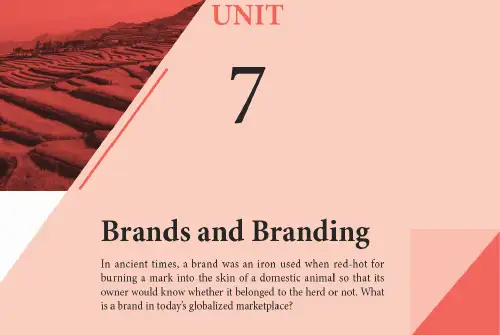
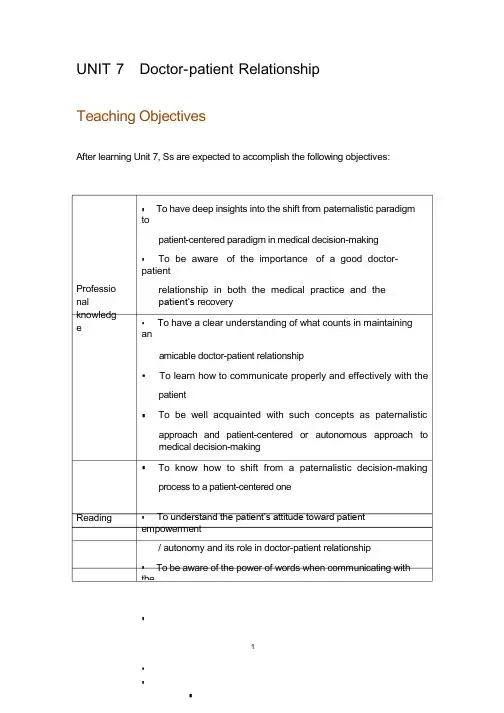
UNIT 7 Doctor-patient Relationship Teaching ObjectivesAfter learning Unit 7, Ss are expected to accomplish the following objectives:Professio nal knowledg eTo have deep insights into the shift from paternalistic paradigmtopatient-centered paradigm in medical decision-makingTo be aware of the importance of a good doctor-patientrelationship in both the medical practice and thepatient’s recoveryTo have a clear understanding of what counts in maintaininganamicable doctor-patient relationshipTo learn how to communicate properly and effectively with the patientTo be well acquainted with such concepts as paternalistic approach and patient-centered or autonomous approach to medical decision-makingTo know how to shift from a paternalistic decision-making process to a patient-centered oneReading To understand the patient’s attitude toward patientempowerment/ autonomy and its role in doctor-patient relationshipTo be aware of the power of words when communicating withtheTeaching Activities and ResourcesPart 1 ReadingText ALead-inSuggested teaching plan1. Doctor-patient relationship is among the most controversial focuses and mostwidely talked about in medical and healthcare communities. It is a determinant factor of quality care. On the part of language, words are sometimes value-laden and possess magic power. The same relationship can be differently connoted by using different terms. Before starting the class, it is advisable to know the implications of these terms: doctor, physician, medical practitioner, provider and patient, client, customer.Doctor: referring to a “teacher ” to show, to teach, or to appear right, and carryinga connotation of being seemly fitting and decentPhysician: denoting a practitioner of the art of healingMedical practitioner: a technique term without much connotationProvider: a generic term more or less related to businessPatient: indicating a suffering or sick person under medical treatmentClient: referring to a person who is willing to pay for goods or servicesCustomer: denoting one who buys goods or servicesAwareness of the subtleties as incurred by the use of the different terms to indicate the doctor-patient relationship will contribute to a better understanding of the characteristics of an amicable and ideal doctor-patient relationship.2. Lead Ss to do Task / Lead-in .1) Ask Ss to think of at least three different situations where doctors may beasked to make “tough decisions ” for their patient s.Decide whether life-support system should be continued or withdrawn.Decide whether euthanasia should be taken into consideration.Decide whether a new therapy should be tried.Decide whether surgery should be the first choice or the last resort.Decide whether transfer or referral is needed.2) Have a quick check and a short discussion on what Ss have come up with.3. Make a summary on the discussion and introduce the topic of Text A.Text ComprehensionSuggested teaching plan1. Launch the topic of the text as a continuum of Lead-in.2. Analyze the text and lead Ss to discuss, integrating Task 2 / Critical readingand thinking / Text A into analysis and discussion. The presentation topics should be assigned to individual Ss for preparation at least one week in advance.Ask other Ss to preview the text with the guidance of the presentation topics.3. Lead Ss to do Task 2 / Language building-up / Text A after a discussion of thetext.4. When analyzing the text, ask Ss to pay special attention to the sentences listed inLanguage focus below.5. If time allows, ask Ss to do Task 1 / Critical reading and thinking / Text A inabout five minutes. Check out the task by asking one or two Ss to read their answers. This is done to get an overview about the text.Language focus1. He was large and powerfully built…miraculously shrinking down to theireye level whenever he spoke with them. (P164, Para. 1)句子运用了对比的手法(large and powerfully built / shrink down to their eye level),有利于加强文章的艺术效果和感染力。
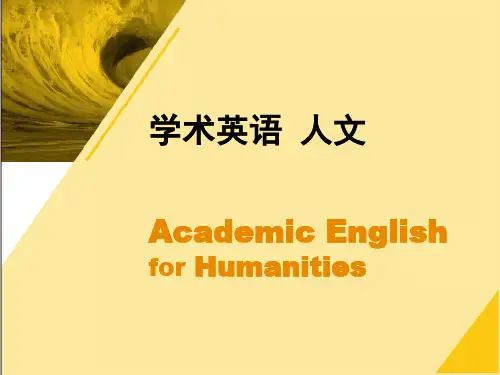
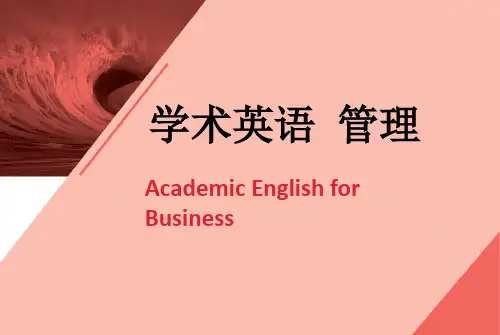
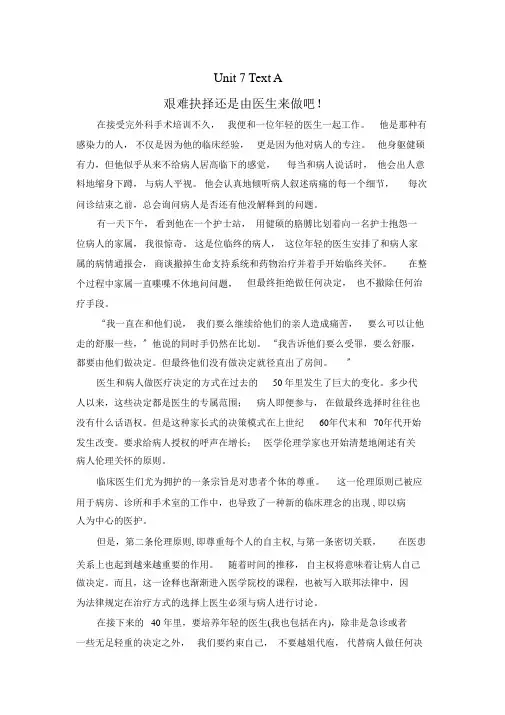
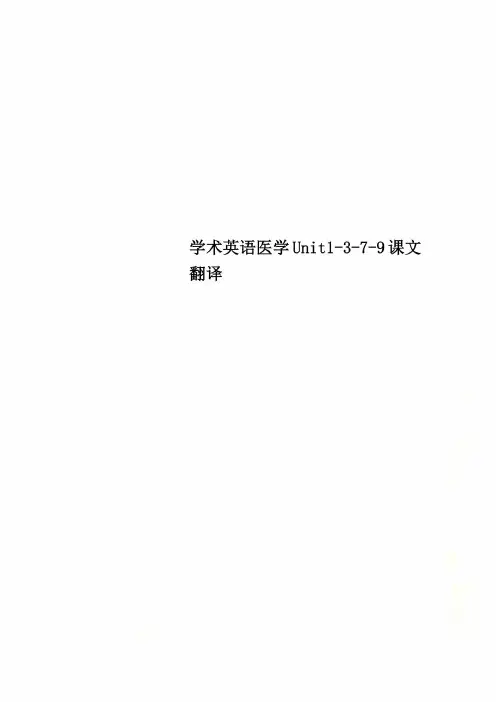
学术英语unit1,unit3,unit4,unit9课文翻译 Unit 1 Text A神经过载与千头万绪的医生患者经常抱怨自己的医生不会聆听他们的诉说。
虽然可能会有那么几个医生确实充耳不闻,但是大多数医生通情达理,还是能够感同身受的人。
我就纳闷为什么即使这些医生似乎成为批评的牺牲品。
我常常想这个问题的成因是不是就是医生所受的神经过载。
有时我感觉像变戏法,大脑千头万绪,事无巨细,不能挂一漏万。
如果病人冷不丁提个要求,即使所提要求十分中肯,也会让我那内心脆弱的平衡乱作一团,就像井然有序同时演出三台节目的大马戏场突然间崩塌了一样。
有一天,我算过一次常规就诊过程中我脑子里有多少想法在翻腾,试图据此弄清楚为了完满完成一项工作,一个医生的脑海机灵转动,需要处理多少个细节。
奥索里奥夫人 56 岁,是我的病人。
她有点超重。
她的糖尿病和高血压一直控制良好,恰到好处。
她的胆固醇偏高,但并没有服用任何药物。
她锻炼不够多,最后一次 DEXA 骨密度检测显示她的骨质变得有点疏松。
尽管她一直没有爽约,按时看病,并能按时做血液化验,但是她形容自己的生活还有压力。
总的说来,她健康良好,在医疗实践中很可能被描述为一个普通患者,并非过于复杂。
以下是整个 20 分钟看病的过程中我脑海中闪过的念头。
她做了血液化验,这是好事。
血糖好点了。
胆固醇不是很好。
可能需要考虑开始服用他汀类药物。
她的肝酶正常吗?她的体重有点增加。
我需要和她谈谈每天吃五种蔬果、每天步行 30 分钟的事。
糖尿病:她早上的血糖水平和晚上的比对结果如何?她最近是否和营养师谈过?她是否看过眼科医生?足科医生呢?她的血压还好,但不是很好。
我是不是应该再加一种降血压的药?药片多了是否让她困惑?更好地控制血压的益处和她可能什么药都不吃带来的风险孰重孰轻?骨密度 DEXA 扫描显示她的骨质有点疏松。
我是否应该让她服用二磷酸盐,因为这可以预防骨质疏松症?而我现在又要给她加一种药丸,而这种药需要详细说明。


Unit7 Dishonoring the Honor systemVocabulary Development [P234-235]A:1.If reviews are not available within four mouths,authors are free to submit themanuscript to another journal and ask them to vet the manuscript.如果复核在4个月内没有得到录用,作者可以把自己的原稿投到其它杂志社,然后让他们审阅原稿。
修改成:如果四个月内没有通过复审2.Despite her great age,she was very graceful indeed,but so far,the archaeologistshave been unable to discover her identity.尽管她的年代久远,而且她确实看起来优雅,但是到目前为止,考古学家们没有发现她的身份。
修改成:1.她确实看着很优雅尽管她的年代久远//无法弄清楚3.Psychologists believe that children are easily influenced by their peer.心理学家认为儿童们很容易受他们同龄人的影响。
修改成:孩子们//儿童4.The old man was always sounding off about higher taxes.那位老人总是爱抱怨高税收。
修改成:抱怨越来越高的税收5.Man will go down into the pit and all his thougts will perish.男人如果进入这个坑里,他所有的想法将会消失。
6.The challenger leveled the champion with a mighty uppercut.挑战者用一记强有力的上勾拳击倒了冠军。
Unit 1A题1 Through language we share experience, formulate values, exchange ideas, transmit knowledge, and sustain culture.我们用语言来分享经验,传递价值观,交换想法,传播知识,传承文化。
2 Metaphor is an implicit comparison between things that are different yet have something in common.隐喻是一种隐含的比较,不同的事物却有共同的东西。
3 In fact, the skillful use of supporting materials often makes the difference between a good speech and a poor one.事实上,能否有技巧地使用论据会造成演讲效果的天壤之别。
4 To be more effective, though, they should be vivid and richly textured.当然,要想演讲效果更好,演讲本身必须生动且结构丰富。
5 Extended examples—often called illustrations, narrations, or anecdotes—are longer and more detailed.延伸举例——也叫解释、叙述或轶事——更长更详尽。
6 Hypothetical examples describe imagery situations and can be quite effective for relating ideas to the audience.假设举例描述的是想象的情景,能够很好地把想法传达给观众。
7 Statistics can be extremely helpful in conveying your message, as long as you use them sparingly and explain them so they are meaningful to your audience. 统计资料非常有助于演讲者传递信息,因为当演讲者适量地运用这些资料并加以解释时,听众就能更好地理解其中的意义。
研究生学术英语读写教程unit7研究生学术英语读写教程 Unit7 的内容如下:主题:学术论文的结构和写作技巧本单元重点:- 了解学术论文的基本组成部分以及各自的作用- 掌握正确的学术论文写作技巧和风格- 学会如何优化学术论文的结构和排版本单元拓展:- 学术论文的阅读和撰写对于研究生来说是非常重要的技能。
通过本单元的学习,学生将学会如何有效地阅读和撰写学术论文,从而提高学术能力。
- 学术论文的结构和写作技巧是研究生学术英语读写教程中的重要部分。
通过学习本单元的内容,学生将能够更好地理解学术论文的结构和组织方式,从而更好地撰写学术论文。
具体内容:1. Introduction- 介绍学术论文的背景和目的- 阐述学术论文的基本组成部分以及各自的作用- 举例说明如何有效地组织 Introduction 部分2. Literature Review- 介绍文献综述的作用和意义- 阐述文献综述的基本组成部分以及各自的作用- 举例说明如何有效地组织 Literature Review 部分3. Methods- 介绍研究方法的重要性- 阐述研究方法的基本组成部分以及各自的作用 - 举例说明如何有效地组织 Methods 部分4. Results- 介绍研究结果的重要性- 阐述研究结果的基本组成部分以及各自的作用 - 举例说明如何有效地组织 Results 部分5. Discussion- 介绍讨论部分的作用和意义- 阐述讨论部分的基本组成部分以及各自的作用 - 举例说明如何有效地组织 Discussion 部分 6. Conclusion- 总结学术论文的主要内容- 强调学术论文的结论和贡献- 举例说明如何有效地撰写 Conclusion 部分 7. References- 列举学术论文中所引用的文献- 注意文献引用的准确性和完整性8. Format and 排版- 了解学术论文的排版格式- 学会如何优化学术论文的结构和排版本单元重点:- 了解学术论文的基本组成部分以及各自的作用- 掌握正确的学术论文写作技巧和风格- 学会如何有效地阅读和撰写学术论文,从而提高学术能力总结:研究生学术英语读写教程 Unit7 主要介绍了学术论文的结构和写作技巧。
Cultural Globalization1. Much of the early development of different languages, customs, and otherdiverse aspects worldcultures resultedfromthe isolation of groups of people from one another. It is not surprising , then, that a degree of cultural amalgamation has occurred as improved transportation and communication have brought people of various societies into ever more frequent contact . Analyzing the blurring of cultural differences inevitably includes a great deal about fast food, basketball, rock music,and other such aspects of pop culture,but such analysis does not trivialize the subject,. Instead , a long standing bottom up line of political theoryargues that the world`s people can build on commonplace interactions and increasing cultural commonalities that engender familiarity with and confidence in one another to create a global civil society that might evolve into a global nation. By the same process, if transnational civil societies develop, then regional andevenglobal schemes of governance could conceivably form and supplement or supplant the territorial state. Scholars who examine the bottom-up process of transnational integration look for evidence in such factors as the flow of communications and commerce between countries and the spread across borders of what people wear, eat, and do for recreation.1、不同语言、风俗习惯以及其他不同的文化背景下,世界文化的早期发展,是从彼此分离的人群中产生的。